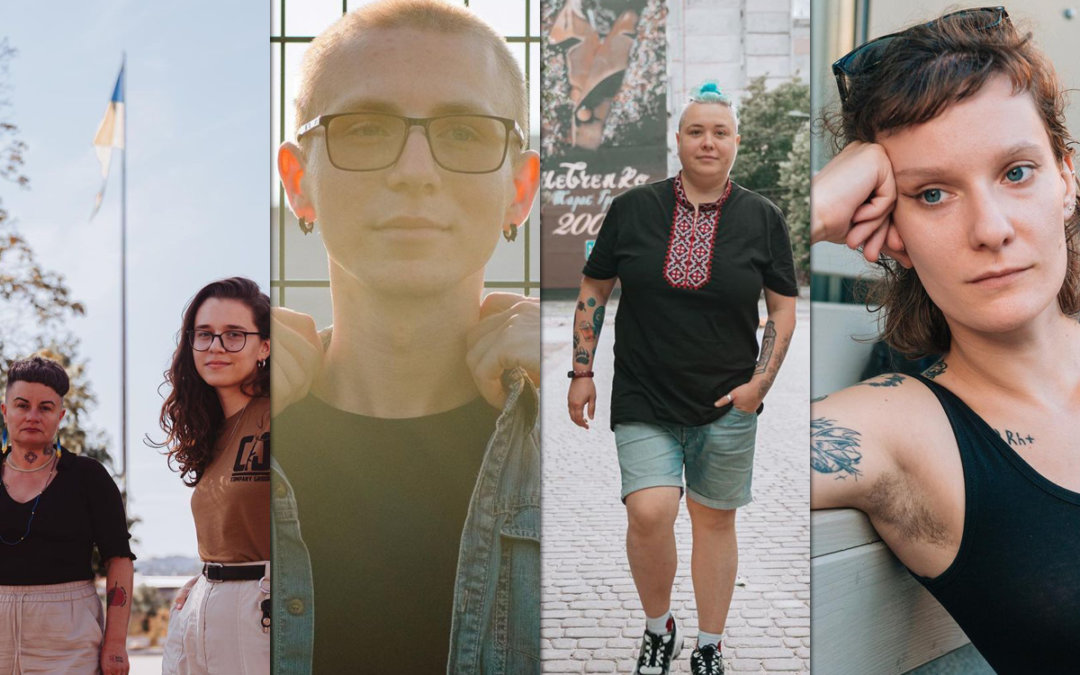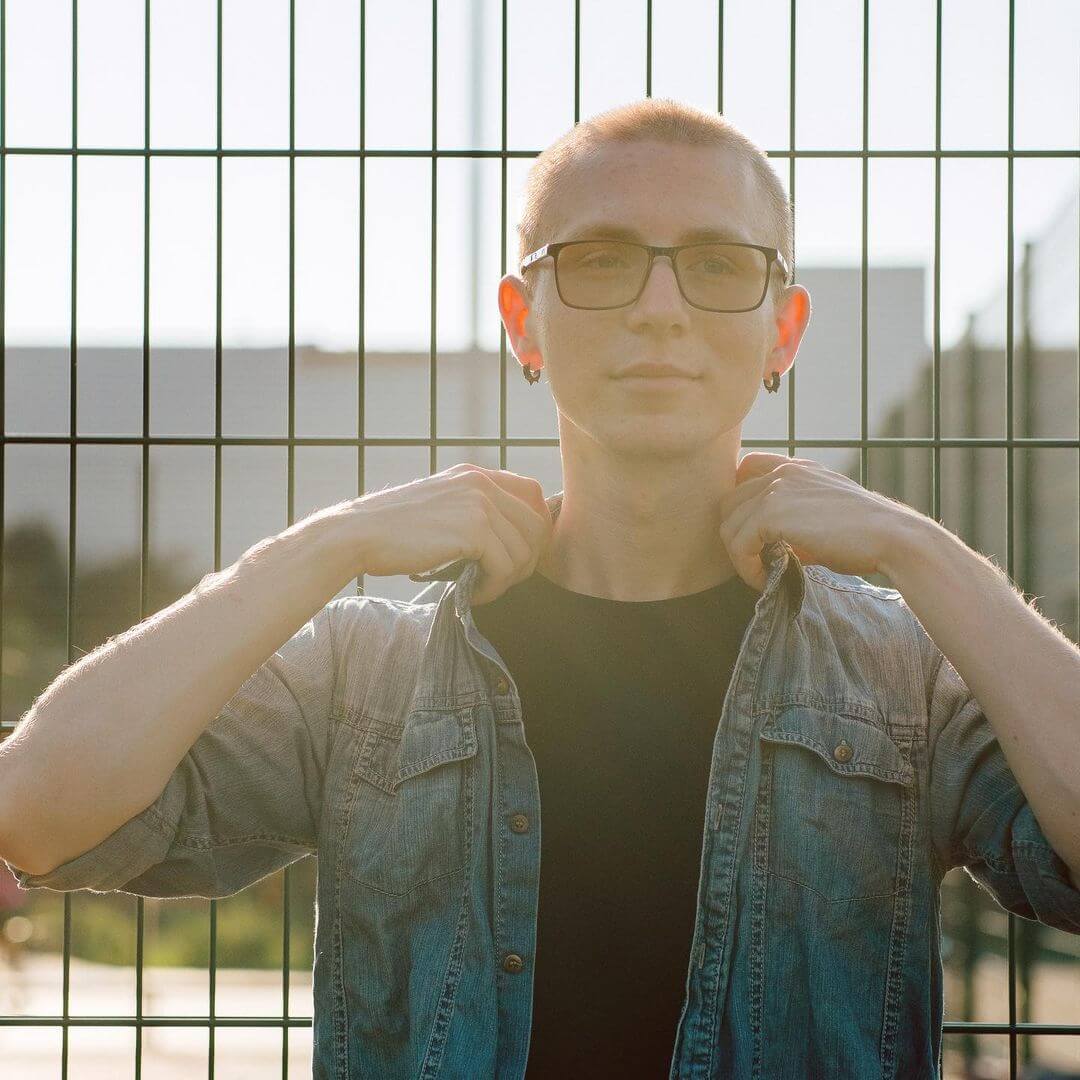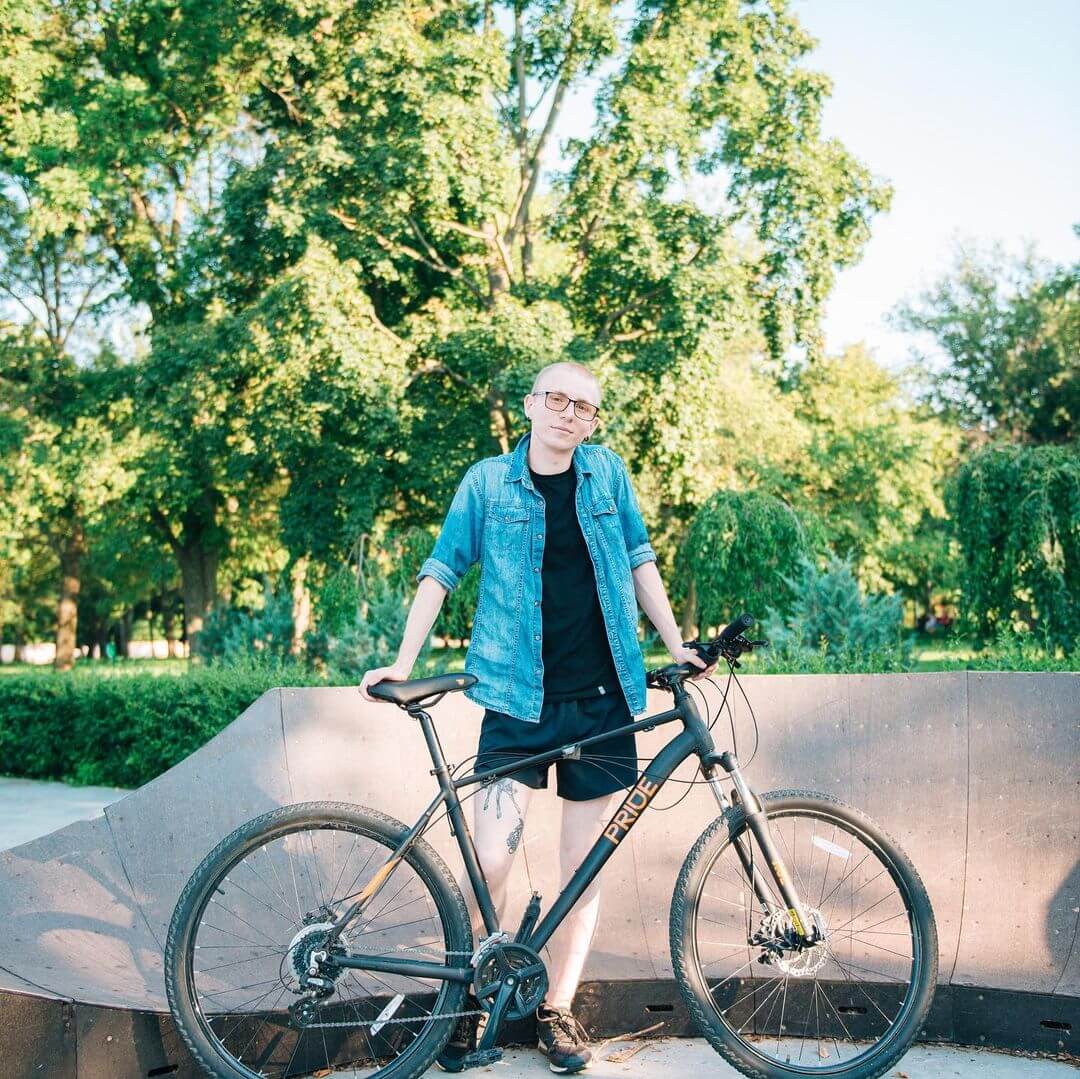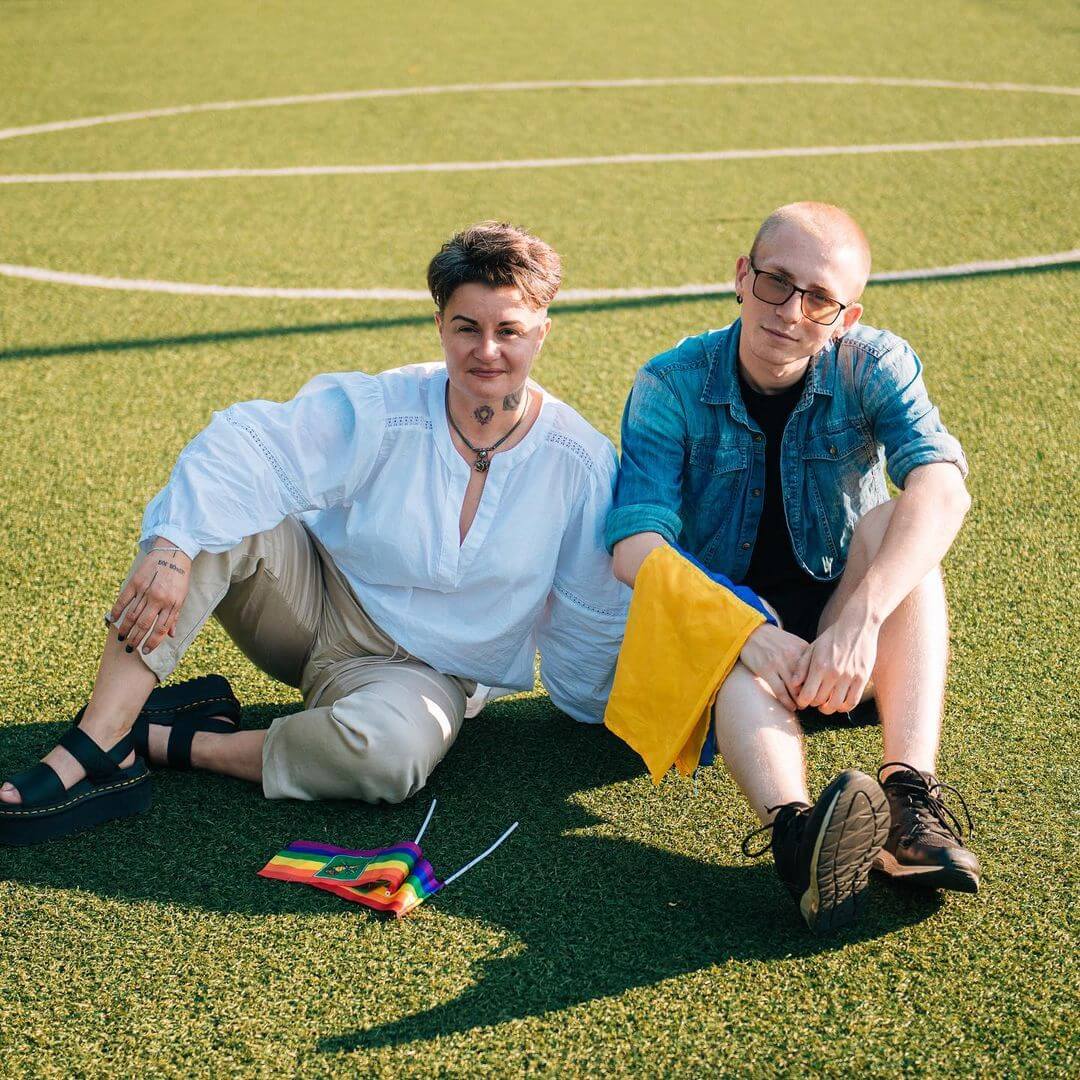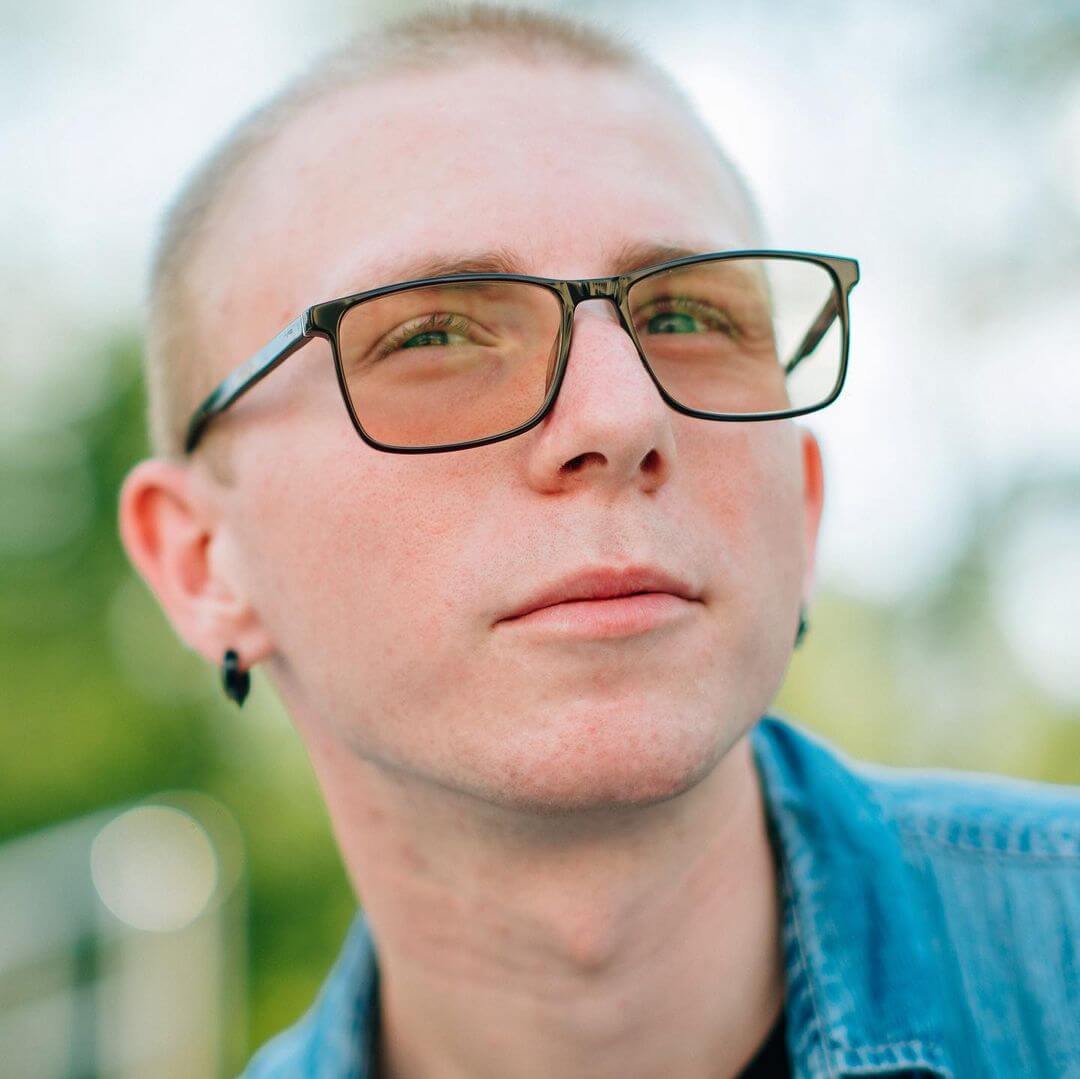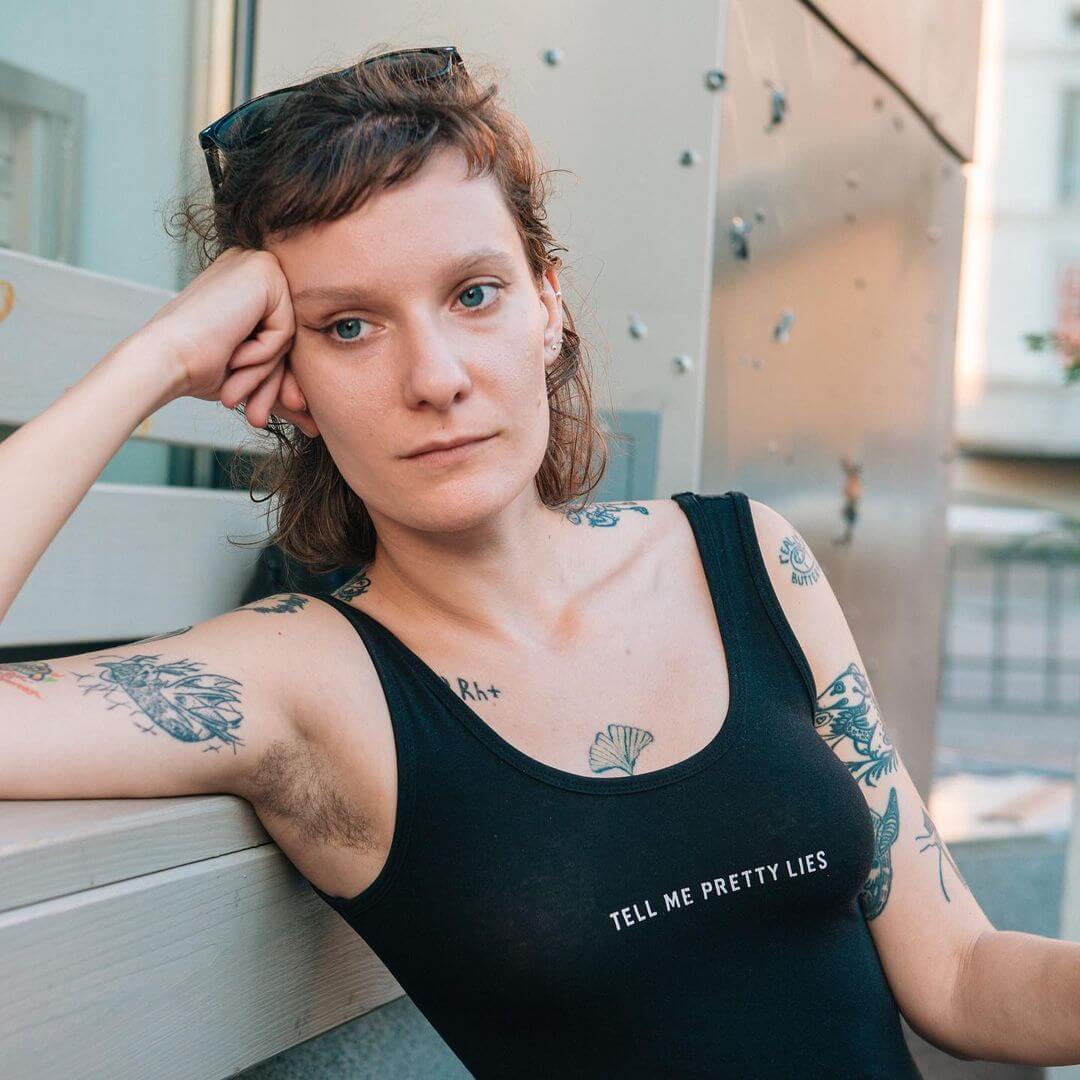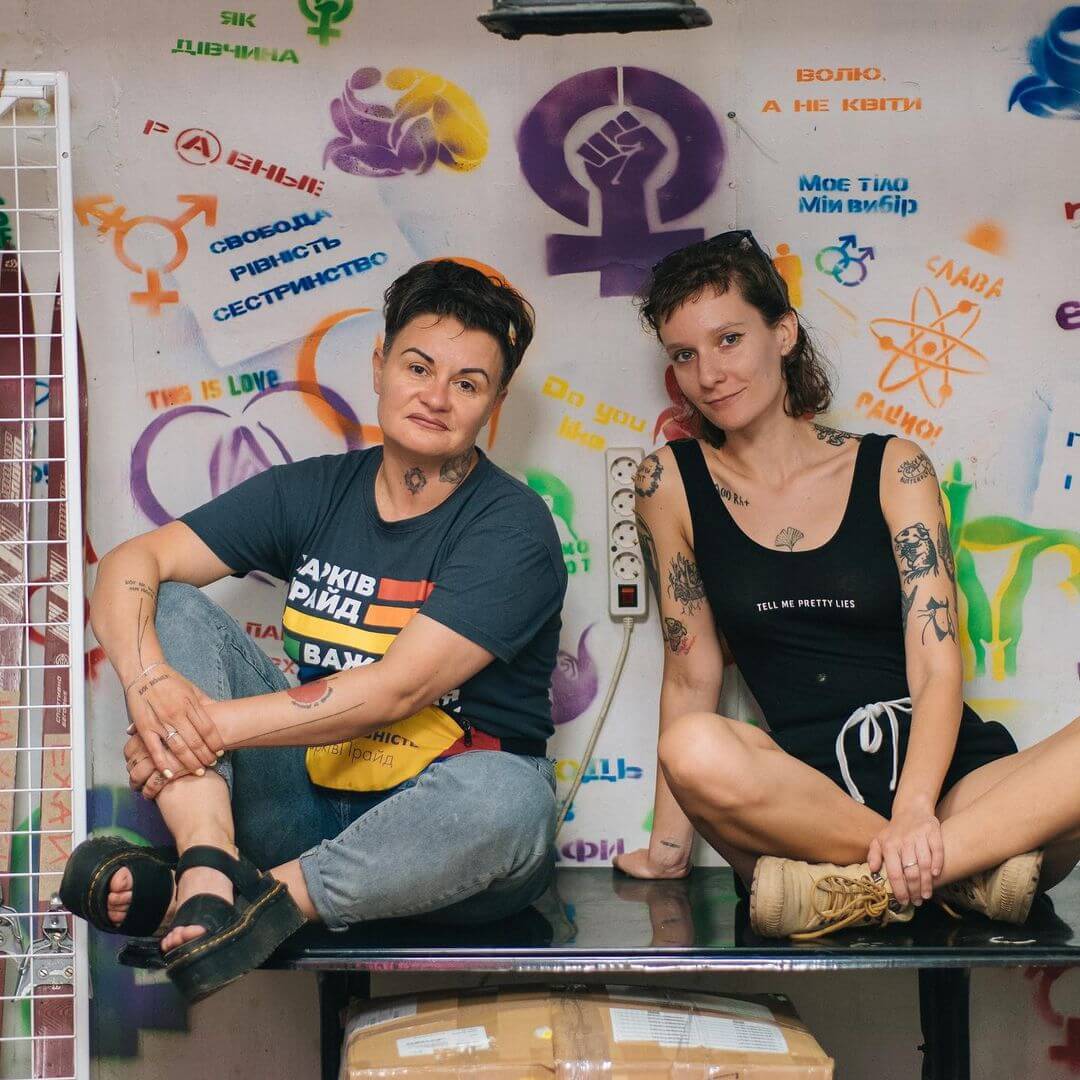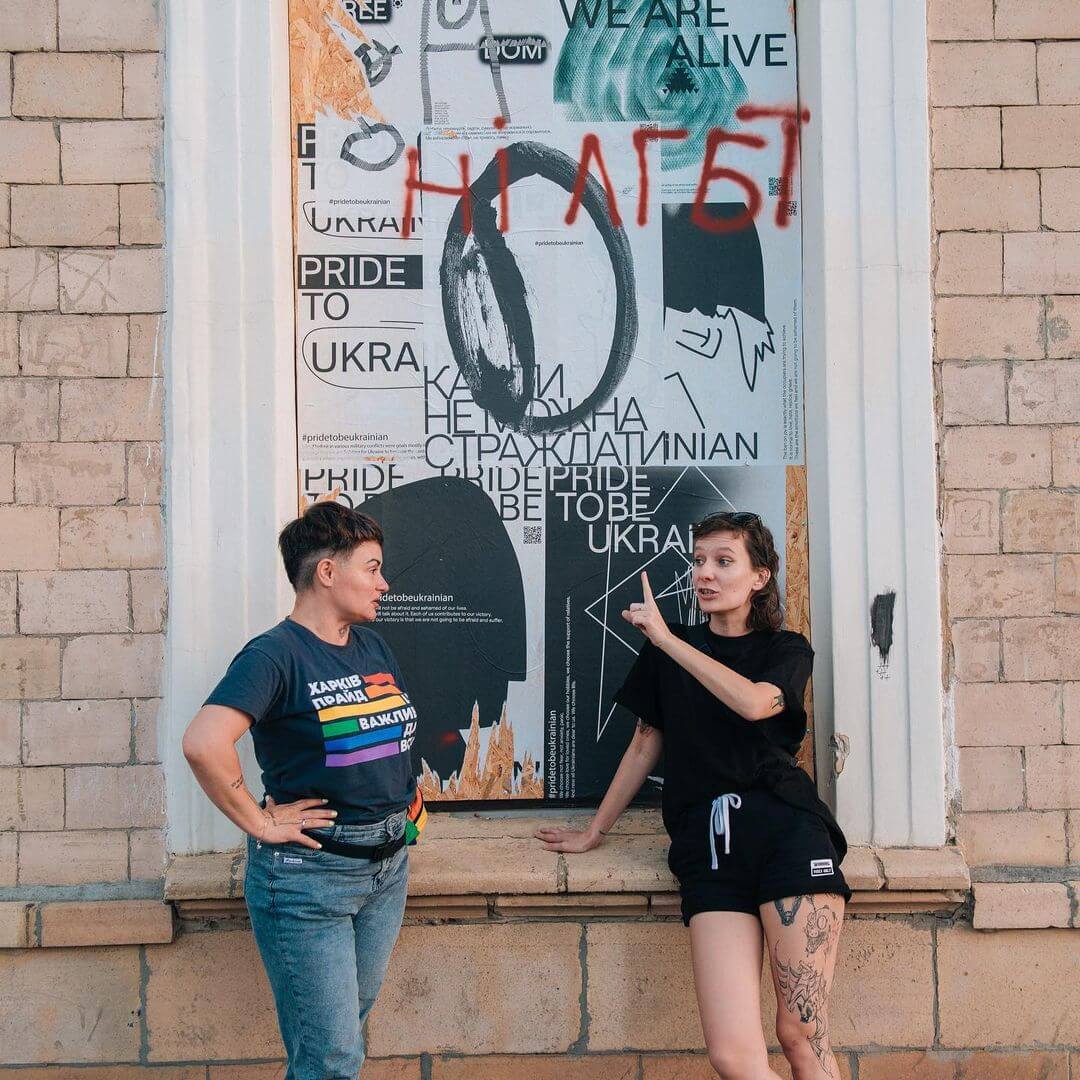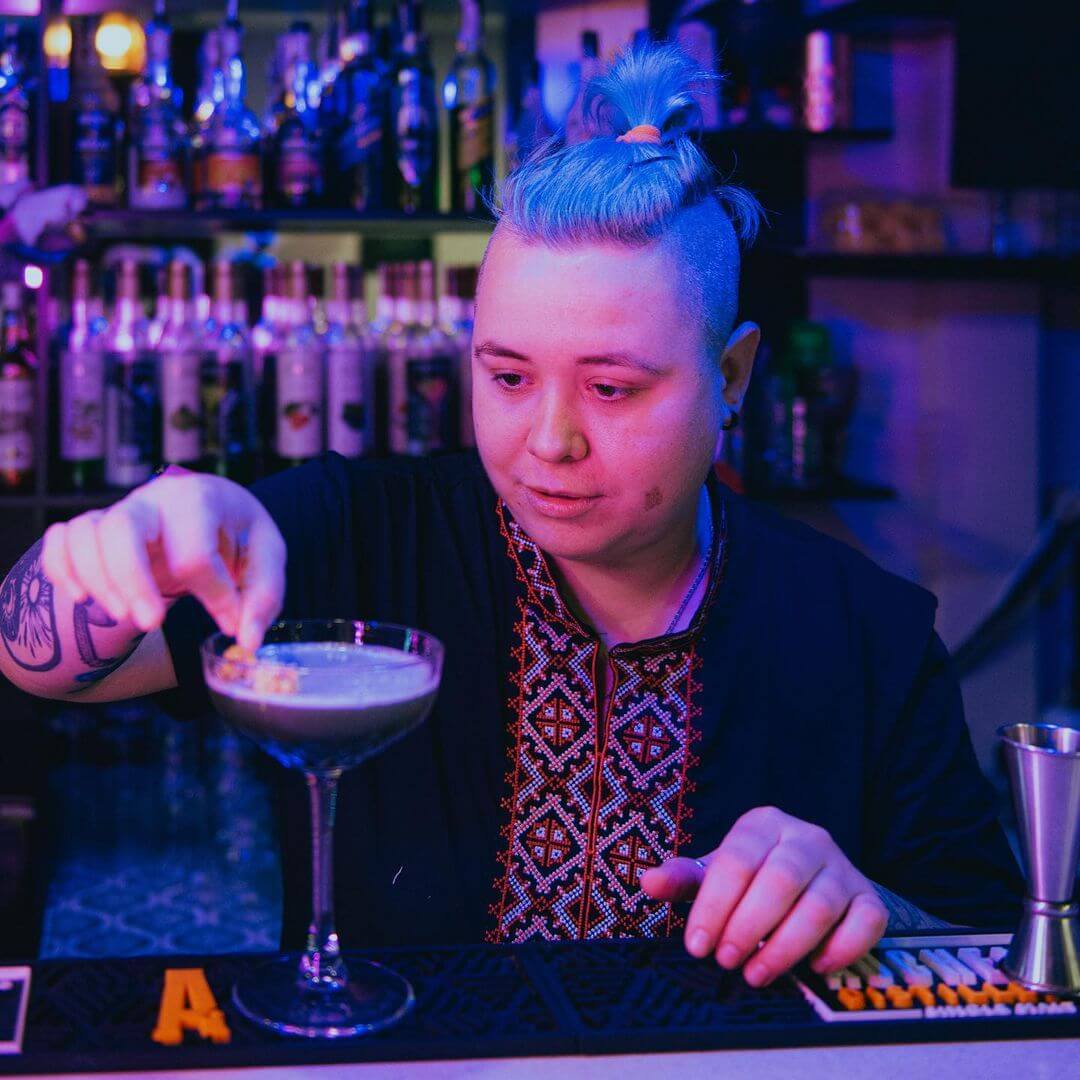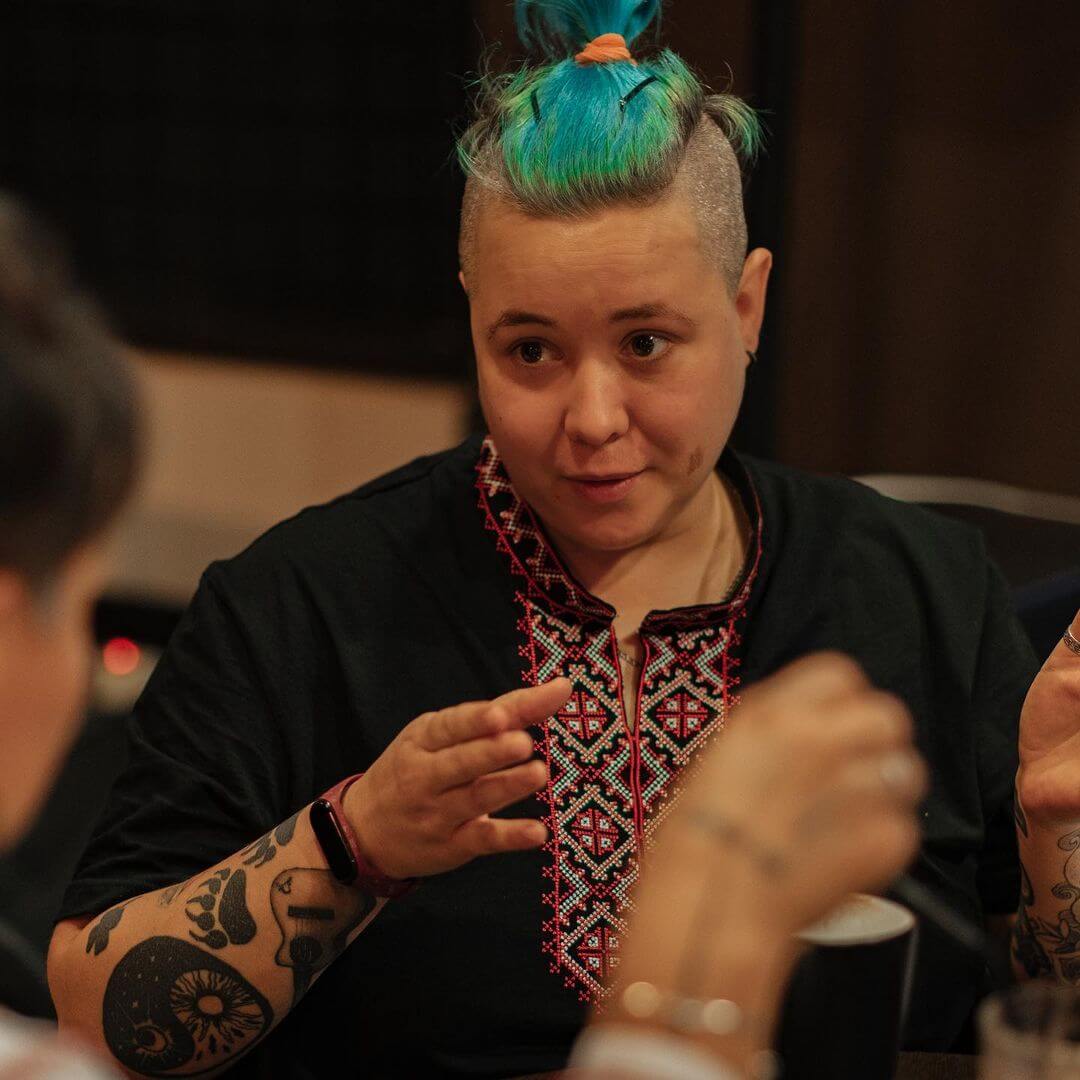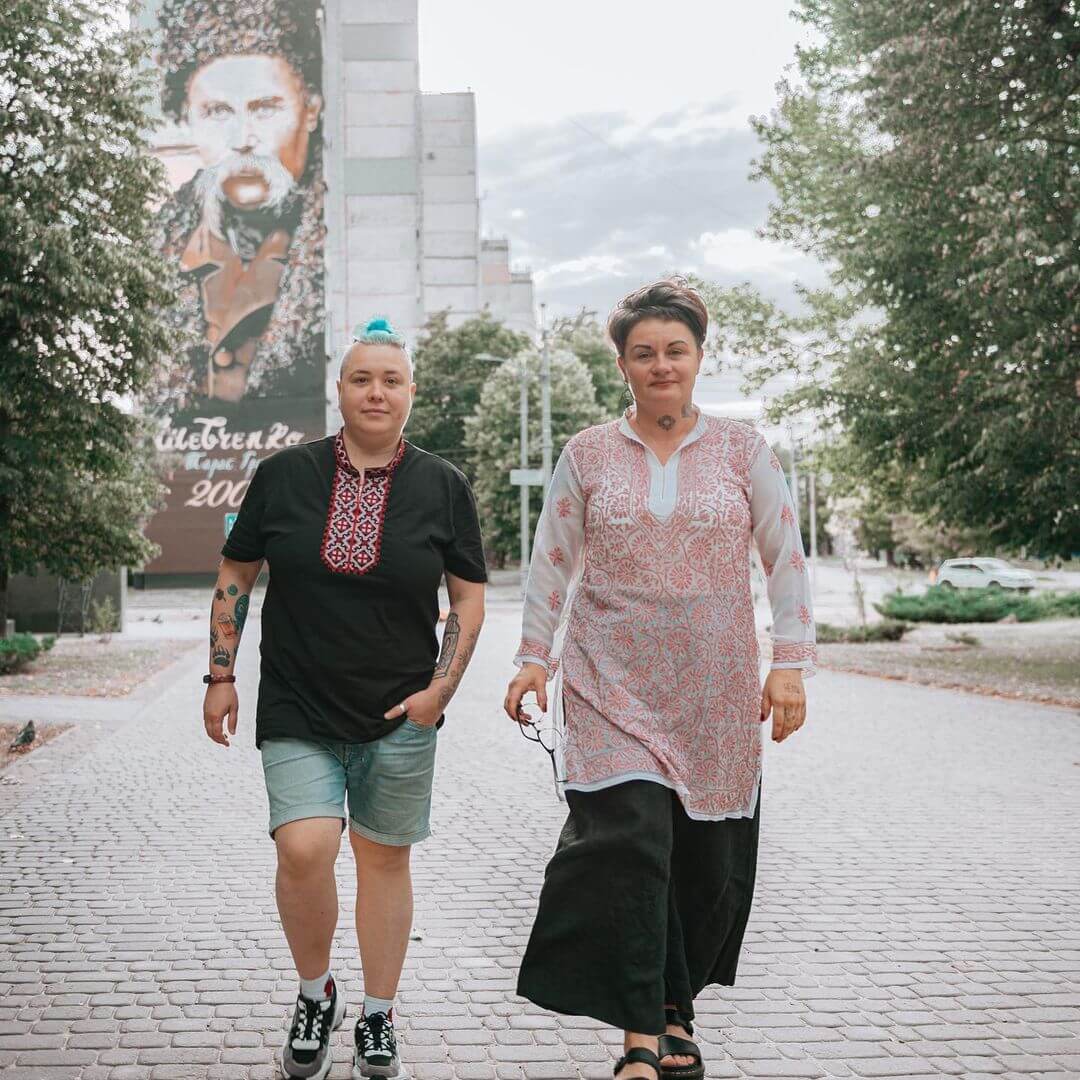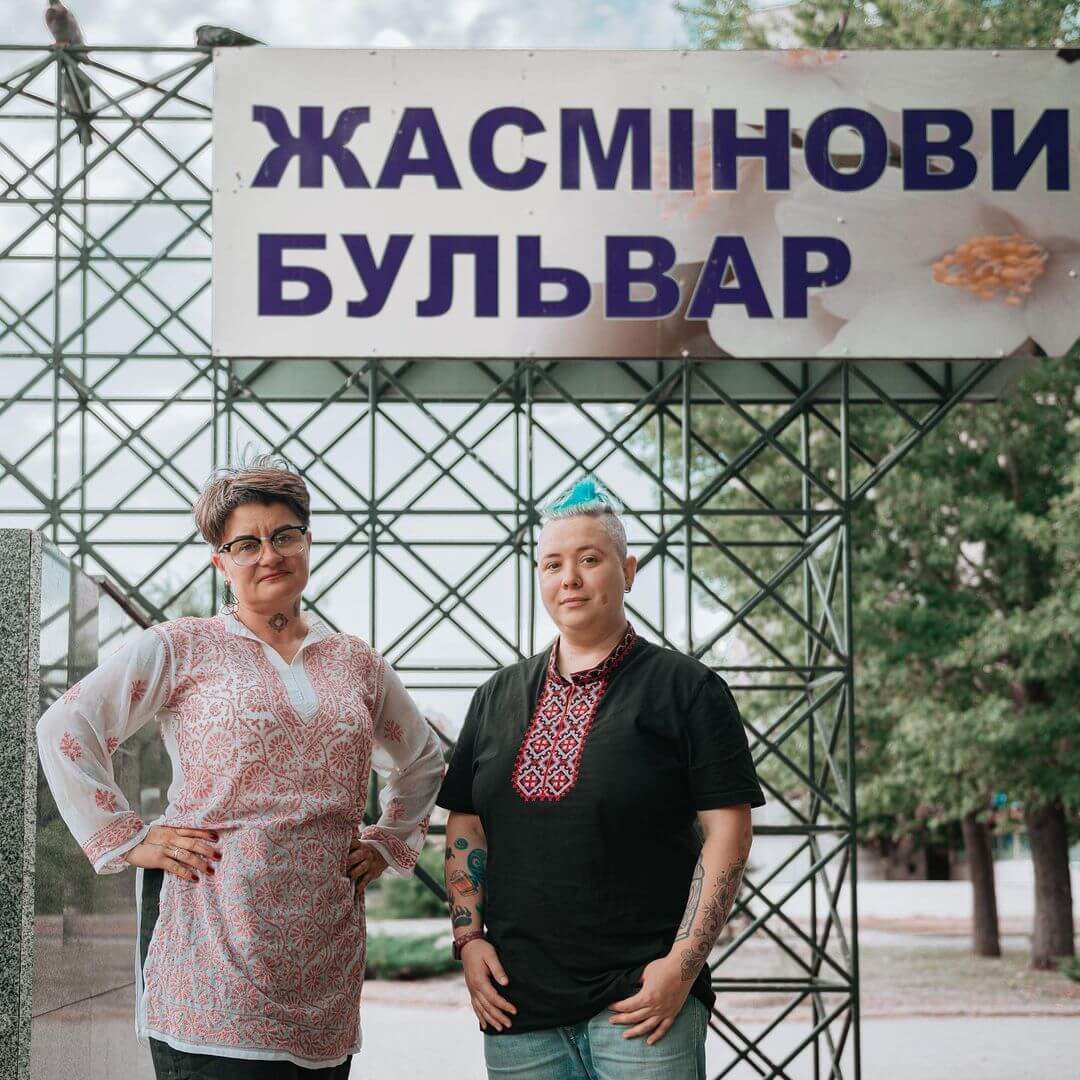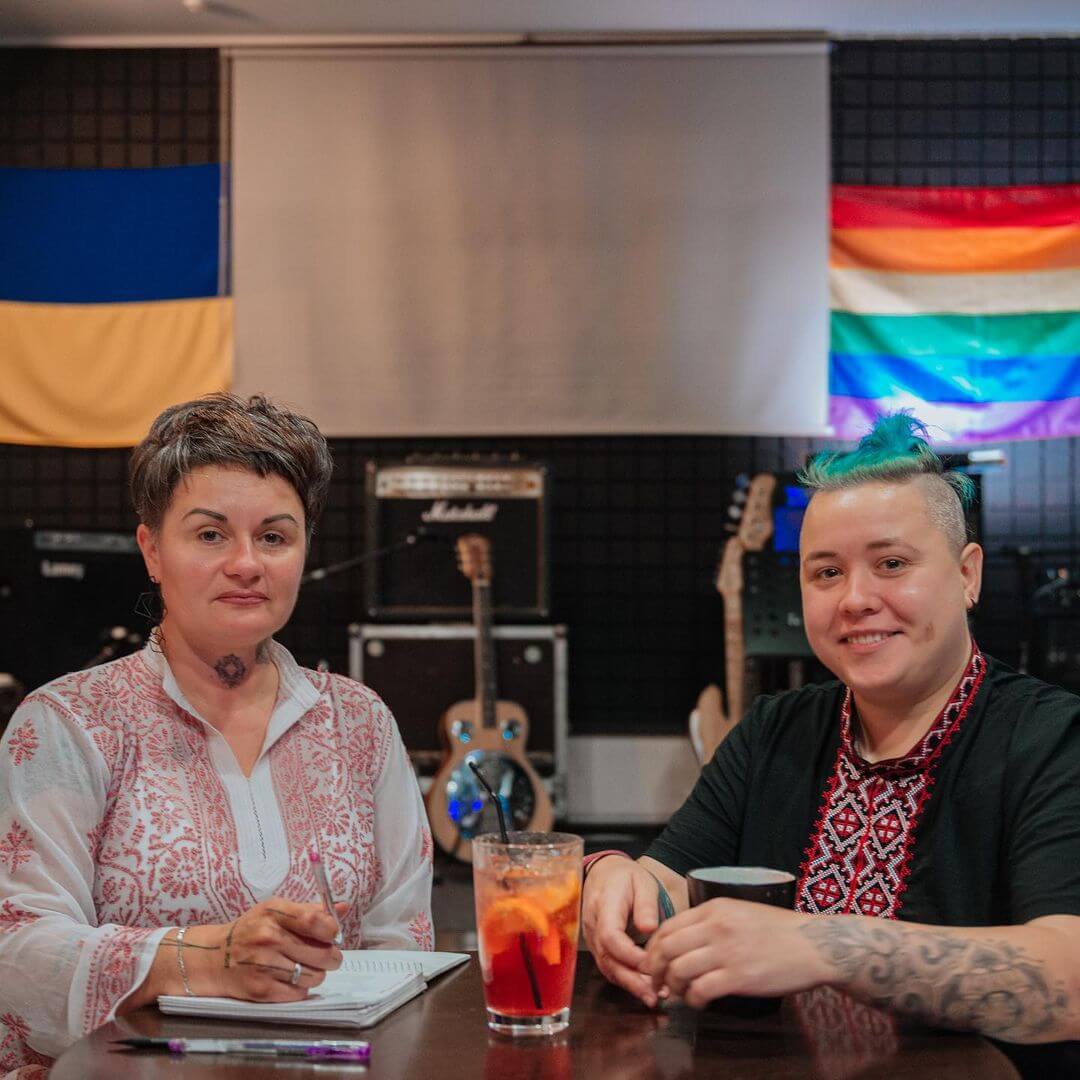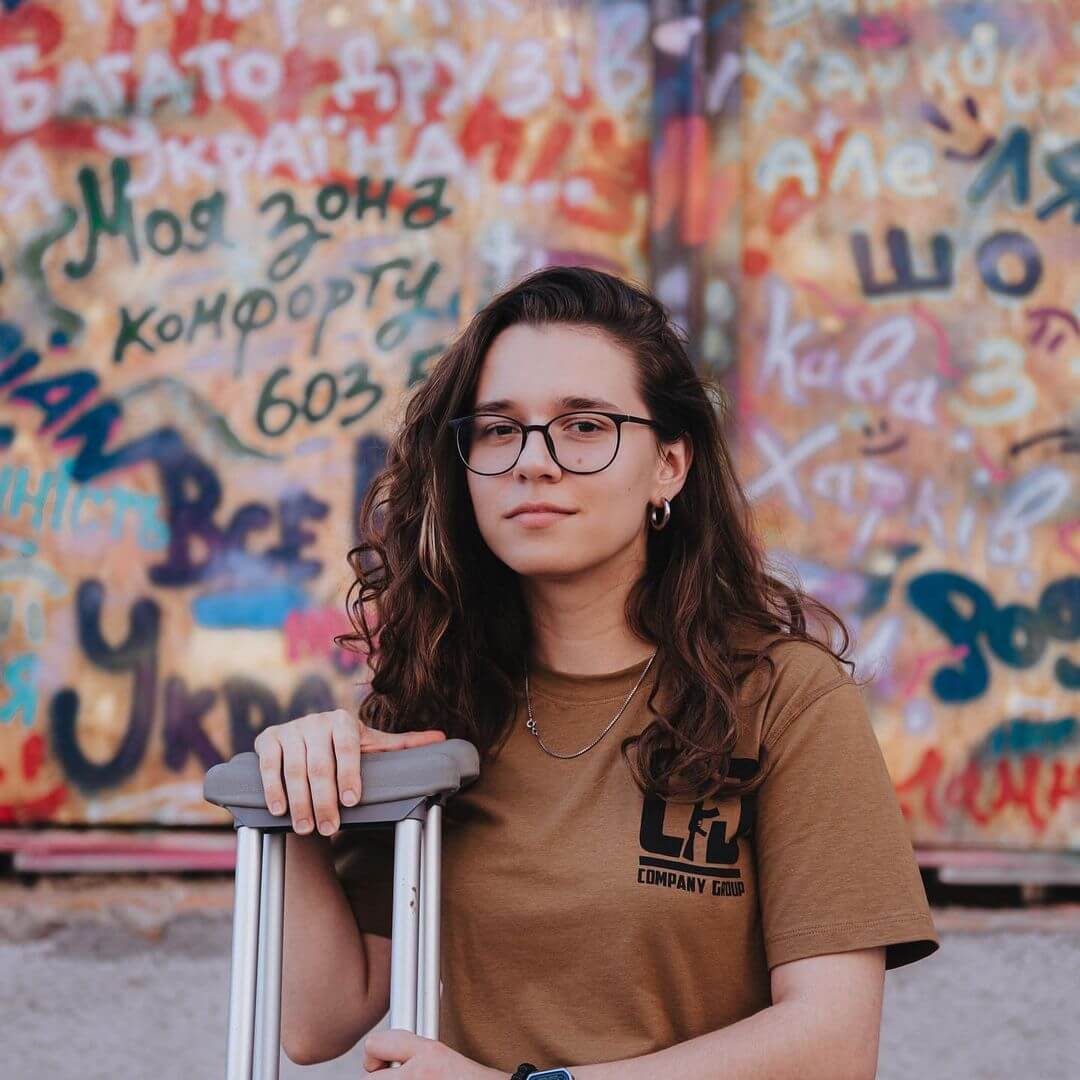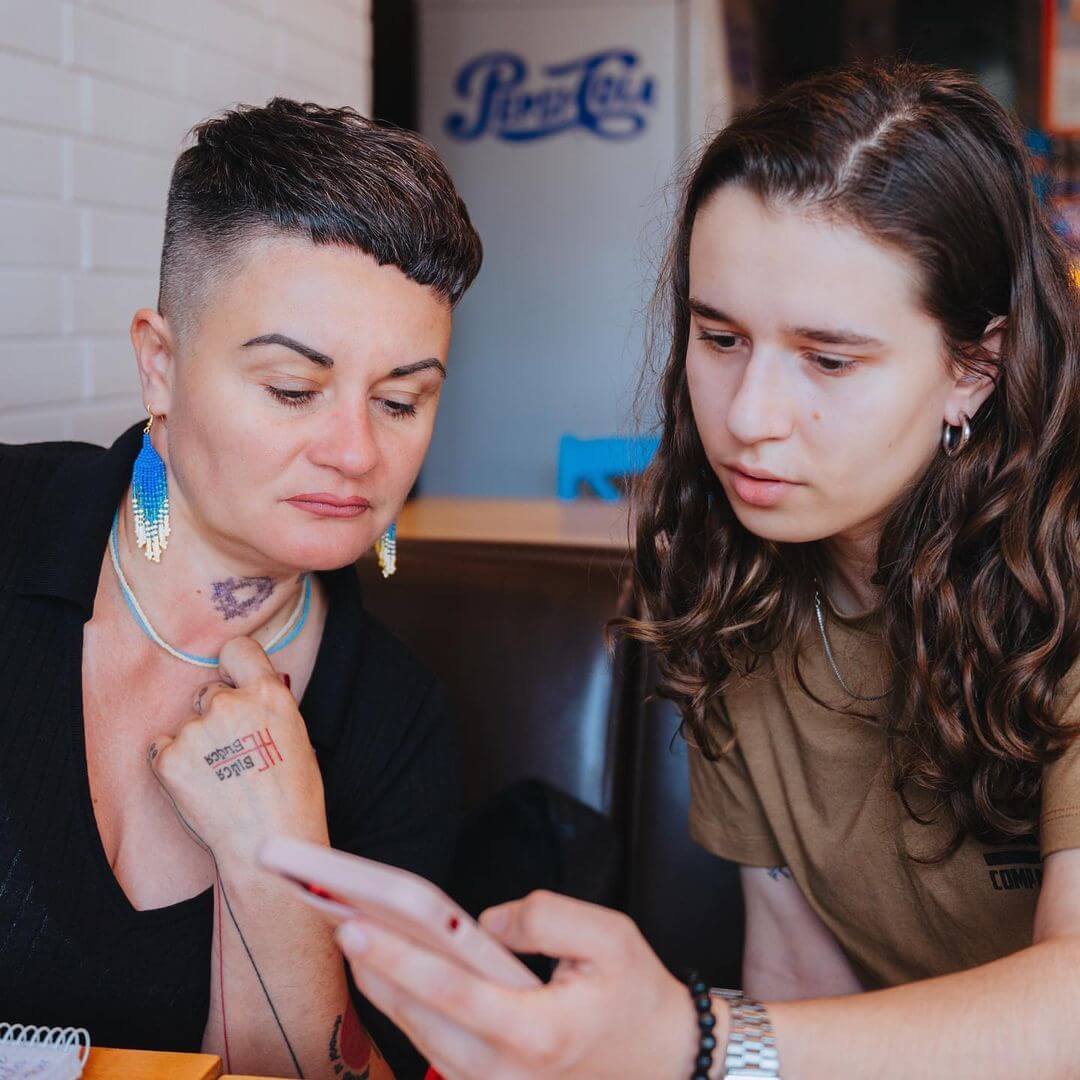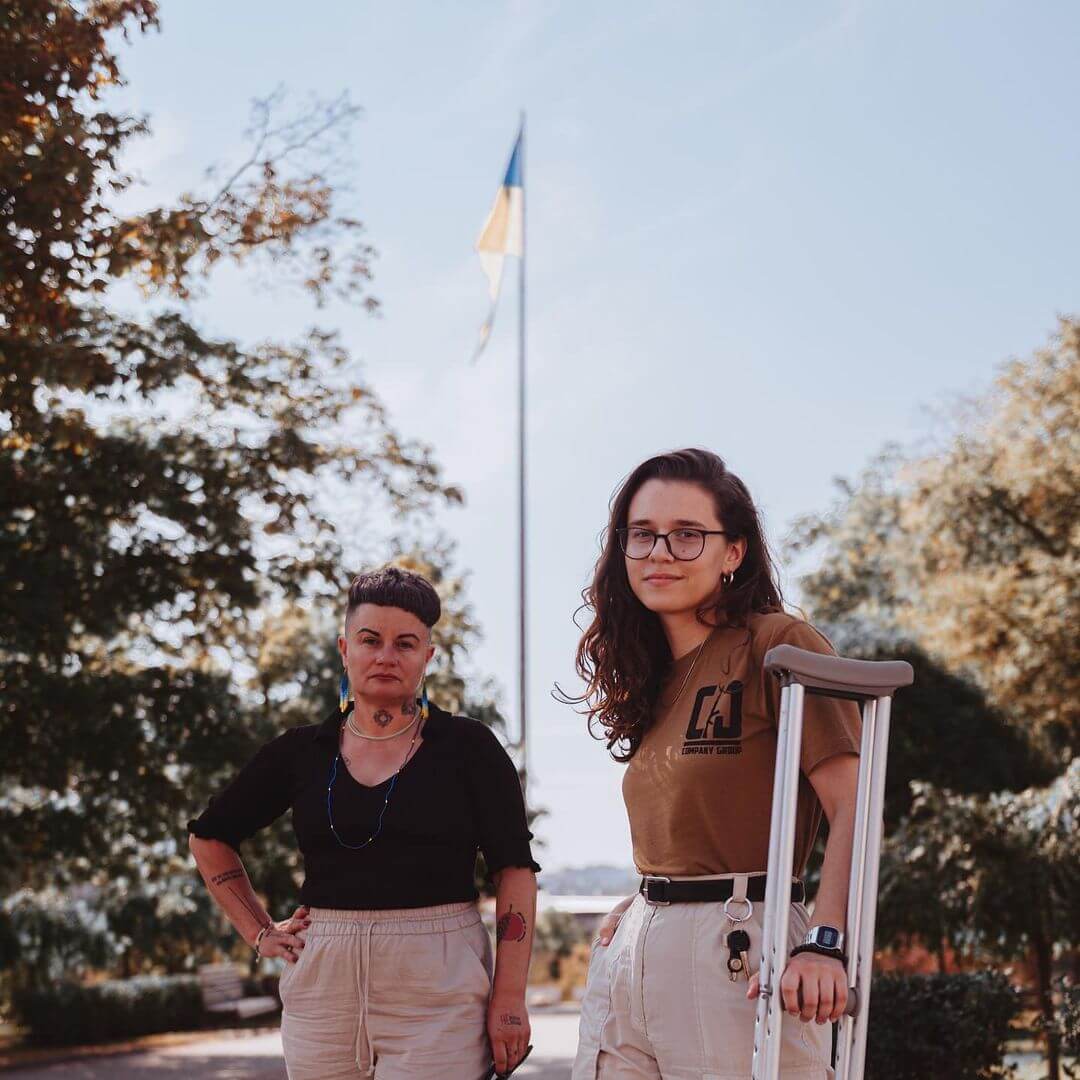Kharkiv. War. LGBT+

Photos by Khrystyna Pashkina
Translated by Valeria Khotsina
Illia Bondarenko
a pansexual queer person
published on August 17, 2022
Today I finally start publishing a series of my reflections on the war based on the stories of LGBT+ people from Kharkiv who chose to stay after Russia attacked Ukraine.
I have an adult son, so I often think about the army, territorial defence units, and other military formations that are so indispensable in Ukraine right now. I have at least three perspectives on this issue: of a citizen of a country fighting the invasion; of a woman who has the privilege of not being mobilised; and of a mother whose son is subject to conscription.
My interlocutor, on the other hand, shares a completely different experience.
As a child, I really wanted to join the army. Not to find a husband there but to gain physical strength and confidence and to be able to fight back. However, I grew up in the context of a peaceful country where the army had become a criminal institution, a place of disciplining citizens’ bodies and neglecting human dignity. Around my way, men talked about military service with such an expression on their faces as if they had eaten something disgusting for a bet — like you had proved that you were a real man, but was it worth it?
Illia: “The army has always been of no interest to me. Talking about it did neither good nor bad — it just made me bored. My father told me that I had to go through it, but I did not understand what for.
After the first months of the big invasion I understood that the army is not always about war, but about a life in harsh conditions where one gets tempered. I even began to be dismissive of anyone who would be like ‘Let me out of the country’. But at the same time, it felt like men were terrified of the army because of a lack of information and prejudice”.
Some 38,000 women are serving in the Ukrainian army. What do we know about them? Some of my acquaintances are professional servicewomen. A few joined the territorial defence or the volunteer battalions. They have no time to talk or write about themselves. Another mobilisation round is announced for October. Or is it conscription? Looks like they can choose if they want to go. There is no information about the procedure, what personnel exactly is needed? What would be their working (or serving) conditions? However, I understand that the army has always been a male army — that is, literally formed from men. So at a time when Ukrainian feminists have significantly influenced the patriarchal structure of our society, the army has remained the cradle of toxic masculinity.
Illia: “I support equal opportunities for women and men in the army. Without excessive care and a dismissive attitude. During training, it was frustrating to see how women were restricted in gaining skills because ‘you don’t need it, you’re a girl’. Some units straightforwardly banned sexual advances but many did not abide by these rules. Situations when such ‘attention’ was appropriate were rather an exception. It made the women irritated and angry”.
My attitude towards serving in the army has changed throughout my life. As a child, I dreamt of joining the army. It was probably only after the full-scale invasion that I thought of myself as a military woman for a second time. My feelings about this inclination change almost daily. There is a mixture of emotions: rage at injustice, fear of humiliation, irritation at being forced, pleasure at finally being able to be useful, and calmness at the inevitability.
Illia: “At some point, I started to feel uncomfortable in civilian life, even though there are a lot of volunteers. And then I lost my home in Severodonetsk. It seemed that my whole life was ruined because of Russia. I began to think about service, and then I got a summons. Therefore, I went to the enlistment office and later to the recruit training in a volunteer battalion.
It was hard. A lot of physical and psychological pressure, and not a minute of peace. At some point, I realised that it would be worse on the battlefield and I might not be able to stand it and fail someone. After a month, I quit. By the way, no one accused me of anything — on the contrary, they were fine with it and even supported me. They said that it was good that I realised it in training, and not during combat”.
What is the Ukrainian army now? A civic duty? An opportunity to be useful to your state? A job with an honourable mission or a forced punishment? I think it means many things to different people. However, I believe that many Ukrainians are now united by the desire to make Ukraine, and thus Ukrainian institutions, better and more decent for a European country.
Illia: “I had a choice because it was a volunteer battalion. I think I need some time to gather my thoughts and prepare myself. When they call me up, I will go fight — it will be easier after a break.
Some men are silent about their concerns and pains and then commit suicide. I believe that if there was less influence of toxic masculinity in the military, there would be more healthy… and living people”.
P.S. At the time of publication, Illia has already been summoned to the military unit. For now, he is packing his bags.
Anna Ziablikova
a pansexual queer person
published on August 19, 2022
Twenty years of my life have been dedicated to finding ways and forms of non-violent resistance. I still believe in the power of words and hate war. Anna Zyablikova has a more extensive experience in the struggle for human rights. She was my first teacher of street and radical activism.
At the beginning of the war, Anna was studying in Belgium. Her Instagram page clearly demonstrates how difficult it was for her to stay outside Ukraine, and she eventually returned to Kharkiv.
Anna: “Currently, non-violent activism is effective outside of Ukraine. It is there, in Europe, that it is important to engage in it to keep Ukraine on the agenda.
Pride marches are not possible in Ukraine now, but almost all other activism is possible because so much has changed. There was a period when I lived in a squat, but now our whole country lives in similar conditions. The mindset in the struggle is similar, too. At first, it seems like you can do anything, you can change everything for the better. And then one day the ideological priorities vanish. No one wants to pass the keys to their flat, even if they have gone abroad. Because people might move in there and burn furniture pulling through the cold. And most likely they will because it is going to be cold as hell. So the priority shifts from common to personal”.
I remember almost five years ago Anna scolding me for calling the police during an attack on the Kharkiv squat. This was followed by heated discussions about involvement and cooperation with the police in ensuring safety during the KharkivPride. Subsequently, Anna has been involved in planning joint action and feedback sessions with the police — people change, they affect change in society, and then the state apparatus changes — this is what I believe in.
Anna: “It still doesn’t feel like cooperation. The authorities behave as if they are going to back volunteering but, if activists disagree, make the voluntary work impossible.
I understand that there are areas where nothing can be done without cooperation with the authorities. For example, the reconstruction of cities. Hundreds of thousands of bats, vulnerable animals listed in the Red Book of Ukraine and protected by international conventions, such as the Bern Convention on the Conservation of European Wildlife and Natural Habitats, spent winter in the panel buildings of Pivnichna Saltivka district in Kharkiv. Fun fact: this convention has been ratified by Ukraine and EU countries, but it has not been signed by the governments of Belarus and Russia. Environmental protection is a political issue, too. Such facts should be taken into account when reconstructing the housing system. I would be up to advising developers and putting together a team of biologists to design the green areas in the best possible way”.
In its early days, the LGBT+ movement in Kharkiv faced physical aggression, particularly, from right-wing radicals. There were attacks on rallies and the community centre, brutal beatings, and death threats. However, this has changed from year to year, and the last Pride March participants walked through the city streets with an escort of (still) a large number of police officers, but there were only a few provocateurs from the opponents’ side. We saw the results of our work and hoped that human rights would become a trend in Ukrainian society. After the war started, it sometimes seemed as if everyone — and I mean EVERYONE — had united. As if everyone had become really indifferent to the sexual orientation of their fellow soldiers. But a few months passed and the swear word “faggot” became more and more frequent, homophobic jokes returned to the public arena and with them the discussion about whether the military should accept aid from LGBT+ organisations and whether it would be better to ban lesbians and gays from serving in the army, rather than to allow them to marry.
Anna: “The discussions continue on Twitter. On the one hand, it’s just typed words, but people are exchanging them.
The relationship between the LGBT+ movement and the conservative movement is changing positively through personal interaction. People fight and work together, stop being afraid of each other and start communicating.
We should keep working for victory, everyone in their own way, and talk openly about these important matters. For society to see that the LGBT+ community is part of it and stands as equals for freedom and democracy in Ukraine. People who were once divided by the police cordon lie on the Heavenly Hundred Alley under the same flags and nothing separates them there anymore”.
Anna Svintsitska
lesbian
published on September 8, 2022
Some things have not changed even with the war — members of disadvantaged groups have to be better than the “majority” to claim the same rights and opportunities. Now it is particularly difficult to say “being myself is my act of courage” because, in fact, something bigger, which many of us identify with, needs our effort, so again personal interests have to give way to public ones. This is why the various media keep showing how women and LGBT+ people are fighting, people with disabilities give donations and help in rehabilitation, and environmental and animal rights activists are saving twice as many animals now.
However, in these difficult times for Ukraine, living and being able to take care of yourself is an important act. This is who Ania is to me: a heroine of the Kharkiv war routine.
Ania: “When I recovered from the shock of the first explosions, I went to wake up old people and got them some water from the vending machine at the entrance hall. Later, I started helping my neighbours buy food. I had an eye on open shops and got into queues. I would buy medicine for families who had small children. People from the upper floor came to sleep over when there were very loud explosions”.
Then she sent a text: “I didn’t want to talk because I realised I would cry. I was born in Oktyabrske near Lyptsi. All my sports competitions took place in Tyshky or Tsyrkuny. I had many friends there. My heart breaks over these lands. When I see the photos or hear the military speak, I realise that in the next few years I won’t even be able to visit the cemetery, where all my relatives are buried. The houses of my relatives and friends have been destroyed or are occupied… Here I cry again”.
In my opinion, more LGBT+ people in Ukraine are now coming out of the closet. In particular, this is a result of the work of many human rights organisations that have put efforts to create a safer environment in the professional and cultural spheres. In most cases, however, tolerance still comes down to the infamous “If they don’t ask, don’t tell”.
Ania: “I didn’t come out — I just stopped concealing it. I answered questions more directly, and people did ask — with interest rather than aggression. Everyone would start recalling their homosexual experiences. They were all straight. These conversations didn’t result in anyone turning away from me. People wanted to stay in touch, and they asked how I was. I became part of the landscape, and they don’t care who I love. It keeps me going, that’s why I stay in Kharkiv — I have a big family that cares about me, not my orientation”.
No, I don’t think we have eradicated homophobia and other types of aversion to diversity. Some might indeed change their minds, but I think there will be others who will grow even more radical.
Ania: “Nobody has got under my skin in all this time. But there was one military man. Once he met me in a shop and started swearing: ‘This is all because of faggots like you’. My hair was dyed, so he squeaked out to me, ‘Go change your hair’. I kept repeating to myself so as not to snap, ‘Ania, he’s the one with the machine gun’.
On the other hand, the owners of Switch bar, where I now work, have hung a rainbow flag — the flag of the LGBT+ movement — next to the Ukrainian one. Since the beginning of the war, they have set up a shelter for neighbours and helped the volunteers. Now the military men often come by. Sometimes they wonder if we are a friendly bar. Girls and boys can make out here. Visitors are completely OK with it. Not once has there been a conflict over it or a complaint about the flag”.
Drawing conclusions from this story is untimely because it goes on — not just for Ania — for the LGBT+ community, for your neighbours, and for our city.
Daria Yantri
a gender-free pansexual person
published on September 24, 2022
Once, I stumbled upon a story about a battalion affiliated with a right-wing organisation refusing technical assistance when they learnt that it came from people involved in KharkivPride.
I have also heard stories that LGBT+ organisations are deliberately choosing the most radical right-wing formations to provide assistance, for example, those who had organised attacks on human rights events.
Just because we don’t understand this doesn’t mean it should be condemned because we seem to live in times where all identities are mixed up — not only in society but also within each individual.
Daria: “So far, people have no energy to even reflect on one’s gender identity. It is easier to think outside of gender. Among other things, being a feminine person in the army is an added difficulty. There are powerful stereotypes about what women can and cannot do, an unspoken division into ‘serious’ and ‘women’s’ work. Men are forced to do the latter as a punishment. In the regular army, this may be better regulated, but in the volunteer battalions, commanders have different optics.
It is very difficult to explain one’s non-binary gender identity to anyone. Many even find it hard to explain that one should not touch a person without their consent. So to be useful to my country, I had to temporarily accept the rules of the game where there are only men and women. But that doesn’t mean that I judge a person by their appearance. It is not a problem for me to ask what pronoun to use when referring to a person”.
To what extent is it possible to be open in the military and how important is it? Personally, I still question the appropriateness of coming out in certain circumstances.
Daria: “I didn’t join the army to do gay propaganda. I was going to defend my homeland, the rest is just an inherent part of me. Participating in war is forced on us, but times are not chosen. I didn’t choose the times in which I would live my young years. So, if I have to go to war, I must not disown myself.
At first, I didn’t share anything about myself at all, but over time I began to get closer to my sworn brothers and sisters. They started asking me, for example, what my job was. There were cases of homophobic conflicts that ended with threats like ‘I’ll come for you after the war’. But also a man suddenly came up and said, ‘I’m sorry I was involved in an attack on your office’, referring to the LGBT+ PrideHub community centre.
I usually choose to state my sexual orientation and queer identity without expecting acceptance, I do it to increase the visibility of the community”.
We spoke to Daria when KharkivPride 2022 was already planned. This person serves in a volunteer battalion and interacts with various military personnel — of course, I cared about their views on Pride in Kharkiv.
Daria: “I am quite gloomy at heart — it’s hard to indulge in joyous events. At the same time, for me, the war started with the death of Elia (Elvira Schemur, a KharkivPride volunteer). We have to pay homage to the people who died. I think it’s very important to remember that. It would be great if KharkivPride took the context into account.
I would like KharkivPride to take place because it’s important to keep living an active life. I don’t want the war to suppress this, I don’t want a big annual LGBT+ event to disappear because the war started”.
Conclusions
published on October 12, 2022
It has been almost a month since I made the last post about the LGBT+ people who stay in Kharkiv. At the time of the interviews, only one of the interviewees was working in the field of defence, while two others had joined the ranks of the Armed Forces or Ukraine or volunteer battalions.
This research was not intended to be quantitative — I wanted to introduce you to the situation of people I personally knew. To show you how their activist and private lives have changed since the start of the full-scale invasion of Ukraine by Russia.
None of us wanted this war, none of us chose to live in war times. However, this struggle proved to be very important for many of us. Therefore, we have put aside some things that were previously important to us to direct resources to the victory of Ukraine. I think this happened because LGBT+ people, more than anyone else, value freedom, especially the freedom to be themselves.
Does war require giving up other identities? My answer is not at all. As before, the justification for silencing one’s sexual orientation may still be a sign of internalised homophobia. But people are also forced to be “closeted” because of the excessive risks of facing hatred from outside: armed homophobes, the indifference of the government, and paralysis of the justice system because of martial law.
Therefore, war should not be an excuse to stop human rights struggles. Human rights may be restricted, but the restriction must be proportionate to the objectives. Our struggle is a struggle for values, otherwise why all our sacrifices?
Nothing beats good old email
For our monthly newsletter, we pick the most important news and analysis,
and add selected content and art from queer creators.
